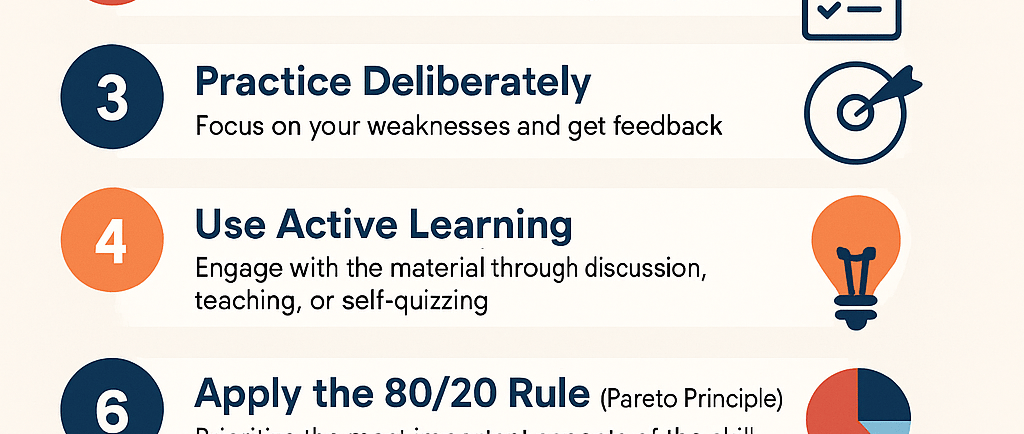How to Master Any Skill Faster: A Guide for Students


In today’s fast-paced world, students are often expected to learn and master new skills quickly—whether for school, hobbies, or future careers. But learning doesn’t have to be a slow or frustrating process. By understanding how your brain works and applying some proven strategies, you can learn anything more efficiently and effectively.
Here’s how to master any skill faster:
1.Set Clear Goals
Before diving into any skill, define what you want to achieve and why. This gives you direction and motivation. Instead of saying, “I want to learn guitar,” say, “I want to be able to play three songs within a month.”
Tip: Use the SMART method—Specific, Measurable, Achievable, Relevant, and Time-bound goals.
2.Break It Down
Complex skills can feel overwhelming. Break them into smaller, manageable parts. For example, if you’re learning to code, start with basic syntax, then move to functions, then projects.
Micro learning (short, focused learning sessions) helps you absorb and retain information better.
3.Practice Deliberately
Not all practice is created equal. Deliberate practice means focusing on your weak areas, getting feedback, and pushing your limits.
Don’t just repeat what you know—challenge yourself.
Make mistakes, reflect, and improve.
Example: If you’re studying math, don’t only do problems you already understand. Tackle the ones that challenge you.
4.Use Active Learning
Passive learning (just reading or watching) isn’t enough. Instead, use active techniques:
Teach the concept to someone else.
Summarize what you’ve learned in your own words.
Quiz yourself regularly.
The more engaged your brain is, the more likely it is to remember.
5.Apply the 80/20 Rule (Pareto Principle)
Identify the 20% of the material or techniques that will give you 80% of the results. Focus on these first.
Example: If you’re learning a language, focus on the most common 500 words—they’re used in 80% of conversations.
6.Space Out Your Learning (Spaced Repetition)
Instead of cramming, space your practice out over days or weeks. This strengthens memory and understanding.
Apps like Anki or Quizlet use spaced repetition effectively for vocabulary, formulas, and facts.
7.Stay Consistent
Even 20–30 minutes a day is better than 3 hours once a week. Consistency builds habits, reinforces memory, and keeps you connected to the material.
Tip: Add your learning time to your daily schedule to make it a routine.
8.Use Multiple Resources
Different resources offer different perspectives. Use videos, books, podcasts, apps, or classes. Sometimes, a new explanation makes everything click.
9.Take Breaks and Sleep
Learning faster doesn’t mean studying nonstop. Your brain needs rest to process and store new information.
Use the Pomodoro Technique: Study for 25 minutes, take a 5-minute break. Repeat.
Also, don’t underestimate sleep—it plays a key role in memory and learning.
10.Stay Curious and Enjoy the Process
The fastest learners are genuinely curious. If you enjoy the process, you’re more likely to stick with it and go deeper.
Even when it’s hard, remind yourself why you started. Celebrate small wins.
Final Thoughts
Mastering a new skill isn’t about being gifted—it’s about using the right strategies. As a student, if you combine smart learning techniques with consistency and motivation, you can accelerate your learning in any field—from academics to arts to tech.
Start small, stay focused, and believe in your ability to grow. The journey to mastery is just as rewarding as the destination.
